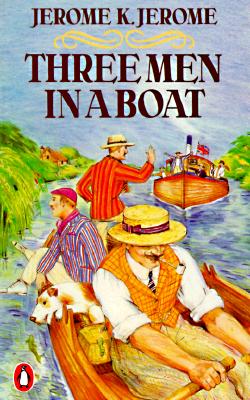It really was a most astonishing trout. The more we looked at it, the more we marvelled at it.
It excited George so much that he climbed up on the back of a chair to get a better view of it.
And then the chair slipped, and George clutched wildly at the trout-case to save himself, and down it came with a crash, George and the chair on top of it.
“You haven’t injured the fish, have you?†I cried in alarm, rushing up.
“I hope not,†said George, rising cautiously and looking about.
But he had. That trout lay shattered into a thousand fragments—I say a thousand, but they may have only been nine hundred. I did not count them.
We thought it strange and unaccountable that a stuffed trout should break up into little pieces like that.
And so it would have been strange and unaccountable, if it had been a stuffed trout, but it was not.
That trout was plaster-of-Paris.
CHAPTER XVIII.
Locks.—George and I are photographed.—Wallingford.—Dorchester.—Abingdon.—A family man.—A good spot for drowning.—A difficult bit of water.—Demoralizing effect of river air.
We left Streatley early the next morning, and pulled up to Culham, and slept under the canvas, in the backwater there.
The river is not extraordinarily interesting between Streatley and Wallingford. From Cleve you get a stretch of six and a half miles without a lock. I believe this is the longest uninterrupted stretch anywhere above Teddington, and the Oxford Club make use of it for their trial eights.
But however satisfactory this absence of locks may be to rowing-men, it is to be regretted by the mere pleasure-seeker.
For myself, I am fond of locks. They pleasantly break the monotony of the pull. I like sitting in the boat and slowly rising out of the cool depths up into new reaches and fresh views; or sinking down, as it were, out of the world, and then waiting, while the gloomy gates creak, and the narrow strip of day-light between them widens till the fair smiling river lies full before you, and you push your little boat out from its brief prison on to the welcoming waters once again.
They are picturesque little spots, these locks. The stout old lock-keeper, or his cheerful-looking wife, or bright-eyed daughter, are pleasant folk to have a passing chat with. [287] You meet other boats there, and river gossip is exchanged. The Thames would not be the fairyland it is without its flower-decked locks.

